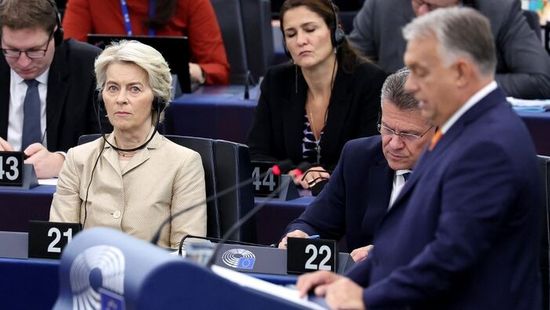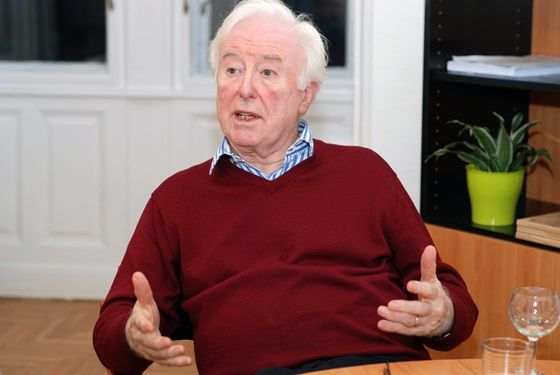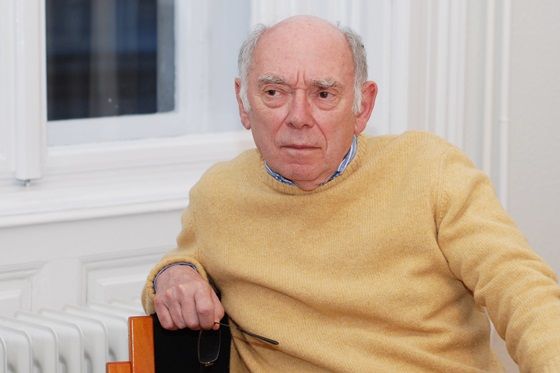John O'Sullivan: I don't think so. British people come to Eastern Europe, Eastern Europeans go to the UK in big numbers. These countries already know each other. There is already a closer relationship. And there are conservative governments in both Hungary and the UK, both of them Euroskeptic in some sense. There are reasons for that. Neither of us is in the center of Europe. The UK is on the periphery, Hungary is almost on the periphery. Neither of us want the EU to be run from one center in Belgium or by one country or by a small central bloc. We both want to live in a multipolar Europe since we already live in a multipolar world.
Mandiner: What do you think about current Hungarian politics? We are in an election year.
John O'Sullivan: I am reluctant to speak over-ambitiously about Hungarian politics. I have been here less than a year, and I do not have a vote. But one thing I have to mention, the degree of bitter partisanship seems to me both excessive and not always justified by the actual policy differences. Both sides exaggerate the conflicts between them. Talk about an authoritarian government banning free speech is obviously not true. And one could give other examples. In general I would like to see cooler politics, calmer politics. And I think we will get that whoever wins the election because this kind of hyper-partisanship is a result of intense political competition that an election will temporarily settle. And whoever wins, I don't think there will be a big change in Hungarian foreign policy. Hungary is a friend of Western Europe and the United States. That will not change. Relations are good today and even improving.
Mandiner: You are right when you talk about the common points between the British and the Hungarian governments concerning the centralization of the EU. But it is not just a question of these viewpoints. The Hungarian government believes in a strong and active state which has a role of solving many problems of the people, and this is not the concept of the Anglo-Saxon conservatives about the size and the role of the state.
John O'Sullivan: Conservatives everywhere tend to be rather pragmatic, sensible and empirical. They try policies: if the policies work, they keep them; if not, they change the policies. My own general opinion is that the differences between Anglo-American liberal conservatism and Hungarian conservatism have been exaggerated. After all, the English have a welfare state. Government spending on welfare and transfer payments in the United States is quite substantial. Neither Britain nor the US are examples of the liberal "nightwatchman state” of the Victorian age. Similarly, Hungary is a country that moved from the bankruptcy of socialism to a free market economy in recent years. Things are still developing. As you know, I am a Thatcherite. Viktor Orbán is a great admirer of Margaret Thatcher. I doubt he thinks that there are big differences between them, but naturally there are some differences. They are from different countries and lived in different times, even if overlapping ones.
Mandiner: Mr O'Sullivan, most people know you as the Special Adviser to Margaret Thatcher in the 1980s. What is Mrs. Thatcher's political legacy in the 21st century?
John O'Sullivan: She restored the idea of economic liberty being an essential part of political liberty. She was a nationalist, a strong
patriot, a great war leader in the Falkland Wars. During the Cold War she gave strong support to NATO and to the United States. The defence of freedom — especially economic freedom — combined with the defence of national interest, that is the legacy of Margaret Thatcher. Winston Churchill’s legacy was exactly the same combination. And I believe these two ideas, in combination, are excellent exports.
Gerald Frost: I agree with that. Mrs. Thatcher recognized that while particular nationalisms might be flawed, the nation state remains the only practical foundation for a functioning democracy. This is one of the reasons that she opposed the European Union. Analsysts vary in their analyyses of what Thatcherism amounted to. For myself, I believe that it rested on a belief about the kind of human qualities – the so-called ”vigorous virtues” - of industry, enterprise and willingness to take risk – which needed to be encouraged if Britain was to rescue itself economically at a particular stage of its history. And her programme worked: Mrs. Thatcher liberated the energies of the British people, especially those of the risk-takers. She set the economy of Britain free.
Gerald Frost
Mandiner: In the UK, 2014 is the fifth year of the Conservative-Liberal government. Many people thought it wouldn't last a year but now it seems they go on together until the elections in 2015. What do you think about these years of the coalition government?
John O'Sullivan: I am critical of it. The economic recovery is very slow and shaky. The harmful economic legacy of the Blair-Brown governments was not cured sufficiently. Things are a bit better now than they were, but the policies are too cautious. All too often the coalition has two policies at the same time. There are issues where Conservatives have found themselves restrained by Liberal Democrats, who don't share their objectives. Most people rightly blame the previous Labour government for the economic situation, but I would be surprised if the Conservative and Liberal parties win the British general election next year.
Mandiner: And what about this year's European Parliamentary elections?
Gerald Frost: UKIP is very likely to win the European elections, taking votes from Conservative and Labour voters, even though it does not have a single parliamentary seat at Westminster. After four years, many people still don't know what Mr. Cameron believes in. There is no intellectual coherence in his government's policies. The cosmetic is placed before substance. The conservatives will pay a heavy price for this, as those who believe in the things conservatives used to believe in - patriotism, the preservation of national sovereignty, a robust national defence and the market economy – vote UKIP.
Mandiner: You are classical Tories. What do you think about the EU crisis? What should be done?
John O'Sullivan: The democratic institutions within the EU are the national parliaments. They hold real debates. Voters follow what they debate and decide. And then the voters make a genuine democratic choice based on what the parties have offered. The European Commission is undemocratic by nature — it is an appointed body rather than an elected one. Yet it has powers at least equal to those of democratic parliaments and governments. If you want to stabilize and increase democracy in Europe you have to hand power back to the national parliaments.
In addition we should expand the areas in which different countries can follow different policies in line with what they think is best for them. More variation is needed in Europe. There is no reason that everybody should be the member of the same group on every topic.
Consider the euro. As a single currency the euro has failed. Those southern European countries will not recover as long as they have the same exchange rate as Germany and the Benelux countries. So people discuss the possibility of creating two euros — a southern one and a northern one. Well, why not? Other countries like the UK and Hungary are not members of the eurozone and they have their own currencies. They are doing better than Greece, Spain, Italy and Portugal as a result.
After all, why should everybody follow the same rules and laws on everything from trade to currency rates and to moral customs? People in rural Hungary and Romania do not have the same moral and religious values or attitudes to sexuality as Swedish Socialists. European social policies should respect this diversity. There is a natural process whereby different European nations become closer to each other among the European nations. Why should it be forced? We should make Europe a more liberal place! A Europe in which nations as well as individuals are free to follow their own paths. Live and let live is the ur-principle of conservatism.
Mandiner: The people of the United Kingdom will shortly have to make serious decisions. What do you think about an independent Scotland?
John O'Sullivan: I would be surprised if the Scots would choose independence. Most Scots only want to use the threat of independence to extract policies and transfer payments from London that are more favorable to Scotland. If I am wrong and the Scots vote for an independent Scotland, one good result is that at least England would have strong conservative governments more or less permanently!
And what do you think about Britain's possible retreat from the European Union?
Will the UK leave the EU? It’s a real possibility, a very plausible outcome. A more likely possibility in the medium term, however, is that relations between the UK and the EU will become less close and Britain more independent within the EU. At some time there might be a final break. But there will be a slow progress to either outcome. Hungary would quietly welcome the second of those outcomes since Budapest too wants a more variable and looser European Union.
Mr O'Sullivan, one last and personal question: did you really move to Hungary?
John O'Sullivan: We rent an apartment and commute between here and Alabama. I always liked Hungary, especially Budapest. My wife and I are enjoying our stay, so the idea of living here permanently is certainly appealing. On the other hand, I know that there is currently an economic emigration from Hungary. But my guess is that the Hungarians are like the Irish: when things get better, they will return.
*
John O'Sullivan, director of the Danube Institute
Born in Liverpool in 1942, he was educated at St Mary's College, Crosby and received his higher education at the University of London. Editor and columnist, is director of 21st Century Initiatives and senior fellow at the National Review Institute in Washington. Earlier posts include editor of National Review, associate editor of the London Times, senior fellow of the Hudson Institute, and special adviser to Margaret Thatcher.
He was made a Commander of the British Empire (CBE) in the 1991 New Year's Honours List. He is the founder and co-chairman of the New Atlantic Initiative, an international organization dedicated to reinvigorating and expanding the Atlantic community of democracies. The organization was created at the Congress of Prague in May 1996 by Václav Havel and Margaret Thatcher. John O'Sullivan has published articles in Encounter, Commentary, The New York Times, The Washington Post, Policy Review, The Times Literary Supplement, The American Spectator, The Spectator, The American Conservative, Quadrant, The Hibernian and other journals, and is the author of The President, the Pope, and the Prime Minister (November 2006).
Gerald Frost, deputy director of the Danube Institute
Author and editor, writes widely about international politics. He has been Director of the London-based Centre for Policy Studies and the Institute for European Defence and Strategic Studies, which he founded. His publications include Hubris: the Tempting of Modern Conservatives.
*
Photos: Bori Réti; borifoto.hu.




